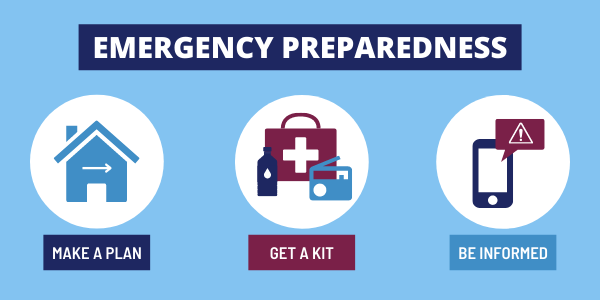Emergency Preparedness

Natural disasters can happen any time. If you are prepared, you will be in a better position to help yourself, your family, and those around you.
Here are a few steps to better prepare you and your family in the event of an emergency:
1. Know the risks
Knowing the risks specific to our community and region can help you better prepare.
2. Make a plan and practice it
Every Chilliwack household needs an emergency plan. Having a plan and practicing it removes some of the unknown in an emergency situation.
3. Get an emergency kit
During an emergency, you may need to get by without power or tap water. You will also need some basic supplies. Plan to be on your own for a minimum of three days.
4. Be informed
Follow local media and the City’s official channels to find accurate information during an emergency.
City of Chilliwack Emergency Program
Our Emergency Program is operated by the Chilliwack Fire Department. The Emergency Program coordinates response from elected officials, city departments and other agencies as per the City of Chilliwack Emergency Response and Recovery Plan.
Emergency Operations Centre
Our Emergency Operations Centre (EOC) will support and coordinate responders during a large scale emergency. Chilliwack regularly provides EOC and emergency management training for municipal staff.
| Attachments | |||
| Description | Date | File Size | |
| Chilliwack Emergency Response and Recovery Plan | 2016-07-22 | 754KB | |
| Emergency Grab & Go Bag | 2011-03-15 | 33KB | |
| What to do after a fire | 2019-07-15 | 4.61MB | |
| Wildfire Preparedness Guide 2019 | 2019-07-15 | 4.22MB | |
Bulletins & Newsletters
Quarterly Chilliwack Emergency Preparedness Newsletter, Special Bulletins and Weekly Emergency Coordination Centre Incident Summaries.
Quarterly Chilliwack Emergency Preparedness Newsletter: | Special Bulletins: | Weekly Emergency Coordination Centre Incident Summaries
Emergency Kits
During an emergency, you may need to get by without power or tap water. You will also need some basic supplies. Plan to be on your own for a minimum of three days.
Emergency Plans
Every Chilliwack household needs an emergency plan. Having a plan and practicing it removes some of the ‘unknown’ in an emergency or disaster situation.
How to Stay Informed in an Emergency
Where to find information in an emergency situation.
Partners in Preparedness
They do everything from leading air and ground searches and helping the victims of serious car accidents to setting up networks of volunteer teams and coordinating services for victims of natural disasters.
Amateur Radio | Emergency Support Services | Search and Rescue
Public Alerting System for Emergencies
The City of Chilliwack uses Alertable to send emergency notifications to subscribed residents, businesses, and visitors during critical events like fires or floods.
Resources for Residents Impacted by Flooding
The lingering effects of unexpected emergencies and disasters are different for everyone. Knowing what to do after an emergency can help reduce stress and aid in a quicker recovery.
Disposal of Flood Damaged Materials | Tips for Dealing with Flooded Basements
Types of Emergencies
Knowing the risks specific to our community and region can help you better prepare.
Earthquake Preparedness | Extreme Cold Emergency Preparedness | Flood Preparedness | Fraser River - Flood Protection Information | Landslide Preparedness | Pandemic Preparedness | Severe Weather Preparedness | Tips to Beat the Heat | Useful Terms to Know | Wildfire Preparedness
